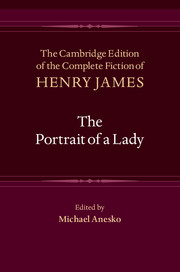Book contents
- Frontmatter
- Contents
- List of Illustrations
- Acknowledgments
- List of Abbreviations
- General Editors’ Preface
- General Chronology of James’s Life and Writings
- Introduction
- Textual Introduction
- Chronology of Composition and Production
- Bibliography
- The Portrait of a Lady
- Glossary of Foreign Words and Phrases
- Notes
- Textual Variants
- Emendations
- Appendices
Chapter 36
Published online by Cambridge University Press: 11 April 2021
- Frontmatter
- Contents
- List of Illustrations
- Acknowledgments
- List of Abbreviations
- General Editors’ Preface
- General Chronology of James’s Life and Writings
- Introduction
- Textual Introduction
- Chronology of Composition and Production
- Bibliography
- The Portrait of a Lady
- Glossary of Foreign Words and Phrases
- Notes
- Textual Variants
- Emendations
- Appendices
Summary
ONE afternoon, towards dusk, in the autumn of 1876, a young man of pleasing appearance rang at the door of a small apartment on the third floor of an old Roman house. On its being opened he inquired for Madame Merle, whereupon the servant, a neat, plain woman, with a French face and a lady's maid's manner, ushered him into a diminutive drawing-room and requested the favour of his name.
“Mr. Edward Rosier,” said the young man, who sat down to wait till his hostess should appear.
The reader will perhaps not have forgotten that Mr. Rosier was an ornament of the American circle in Paris, but it may also be remembered that he sometimes vanished from its horizon. He had spent a portion of several winters at Pau, and as he was a gentleman of tolerably inveterate habits he might have continued for years to pay his annual visit to this charming resort. In the summer of 1876, however, an incident befell him which changed the current, not only of his thoughts, but of his proceedings. He passed a month in the Upper Engadine, and encountered at St. Moritz a charming young girl. For this young lady he conceived a peculiar admiration; she was exactly the household angel he had long been looking for. He was never precipitate; he was nothing if not discreet; so he forbore for the present to declare his passion; but it seemed to him when they parted—the young lady to go down into Italy, and her admirer to proceed to Geneva, where he was under bonds to join some friends—that he should be very unhappy if he were not to see her again. The simplest way to do so was to go in the autumn to Rome, where Miss Osmond was domiciled with her family. Rosier started on his pilgrimage to the Italian capital and reached it on the first of November. It was a pleasant thing to do; but for the young man there was a strain of the heroic in the enterprise. He was nervous about the fever, and November, after all, was rather early in the season. Fortune, however, favours the brave; and Mr. Rosier, who took three grains of quinine every day, had at the end of a month no cause to deplore his temerity.
- Type
- Chapter
- Information
- The Portrait of a Lady , pp. 345 - 353Publisher: Cambridge University PressPrint publication year: 2016

